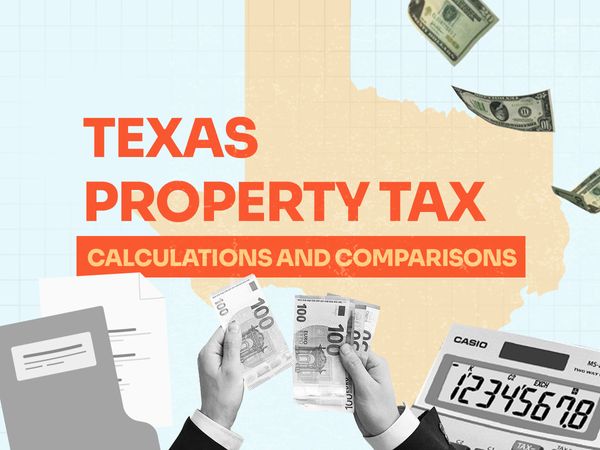Texas boasts the sixth-highest property tax rate in the country. If you're a homeowner in Texas, understanding how property taxes are calculated will help in ensuring that you pay only your fair share.
Introduction to Texas Property Taxes
Texas property taxes are a bit different—and a bit higher—than they are in other parts of the country, which is largely due to the fact that Texas doesn't impose a personal income tax on its residents. For that reason, local governments are highly dependent on property taxes to fund public services, including schools, fire departments, police departments and infrastructure projects. Due to this dependence, the property tax burden may be higher here than in other areas of the country.
To ensure you're only paying fair share, it's essential that Texas property owners like you understand the property tax structure and potential exemptions for which you may be eligible to ease the property tax burden.
How Much is Property Tax in Texas?
Property tax in Texas ranks approximately sixth on average in the United States, at approximately 1.6%. However, each county or taxing unit has its own property tax rate, ranging from Ellis County at a 2.58% rate to Crockett County at 0.37%. Though Texas has 254 counties—more than any other state in the country—it has roughly 4,000 different taxing units, so knowing how much you're paying and why can be a bit complicated.
The average Texas homeowner pays approximately $3,800 per year in property taxes, but numerous exemptions exist that ease the property tax burden.
How is Texas Property Tax Calculated?
To begin with, it's important to understand that the state of Texas doesn't impose property taxes on homeowners in the Lone Star State. Local taxing authorities, such as cities, counties, school districts, and special districts are responsible for determining the property tax rate in their jurisdiction. Assessors appointed by the local governments and taxing units are tasked with appraising the value of all properties, and informing residents in a timely manner of any changes to their property's assessed value.
If you would like to estimate or calculate your property tax bill, the equation is quite straightforward. Simply multiply the appraised value of your property by the established property tax rate in your county or district. For example, if you are a homeowner in Dallas with a property appraised at $400,000, your property tax rate in 2023 is 2.22%. When you multiply $400,000 by 2.2%, the resulting property tax estimate is about $8,800.
For many homeowners in Texas, the annual property tax is a burden, but there are some avenues to lower your overall property tax bill, namely in the form of exemptions. In Texas, there are numerous exemptions available, for those residents who use their property as a primary homestead, as well as senior citizens, veterans and those living with disabilities.
There is information on how to file for these exemptions on every property tax bill, but many homeowners turn to professional tax experts, like the team at Bezit, to navigate these potentially complicated waters.
Key Differences Between Property Taxes in Texas and Other States
Property taxes are collected in every state, unlike personal income taxes, but each state puts its own particular spin on the administration of property taxes. Knowing how Texas differs from other states in terms of property tax law will potentially help you save money on your tax bill, and also feel better about the property tax rates in the state, which can initially seem quite daunting!
Each year, property tax rates in Texas are recalculated following an assessment of all the property values in a given county or tax district. While these tax rates can change every year, due to shifting nature of the real estate market and property values, these fluctuations are usually small and gradual. Tax assessors appointed by local governments will make these assessments and recalculations, then send you a tax bill in October of each year; your property taxes will be due by January 31 of the following year. Upon receiving your property tax bill, you are well within your rights to file a protest if you feel that the value assessment of
your property is inaccurate or unfair.
Interestingly, Texas voters recently passed a major Proposition that will ease their property tax burden even further. As of November 2023, for the next three years, the taxable value of someone's property that is not their primary homestead cannot increase by more than 20%, provided the property doesn't exceed $5 million in value. Additionally, the homestead exemption on school district taxes was raised from $40,000 to $100,000, entirely eliminating property taxes for thousands of Texas homeowners whose homes are valued below $100,000. Finally, more provisions were put in place for senior citizens to receive their fully homestead exemption, as previous laws didn't fully protect the rights of Texas seniors.
Conclusion
Being informed about your property tax responsibilities in Texas is the best way to properly plan your annual budget, and knowing the right way to lower your tax bill is the smartest way to ensure you're only paying what you owe.
Texas is an incredible state in which to own a home, so don't let a seemingly high property tax rate dissuade you from moving to or staying in the Lone Star State. The state's steadily rising home prices are countered by fair local policies and numerous exemptions for homeowners to claim.
Working with a property tax company like Bezit can ensure that your dream of owning a home in Texas becomes an affordable reality!

